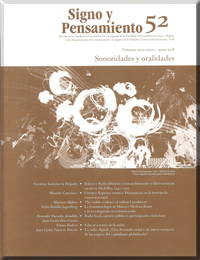Abstract
Aiming to overcome the characteristic sentimental discourse used in the literature on bolero in Colombia, this article explores this musical genre as a cultural product linked to the phonographic industry, radio broadcasting, and the film industry. Combining archival research and data collected in various interviews, the author explores the reception and consumption of bolero in Medellín between 1930 and 1950 with the purpose to analyze the listening practices that bring about bolero’s deep root in popular tastes.
Franco Vélez, J. (1984), Hildebrando, Medellín, Editorial Universidad de Antioquia.
La Defensa (1940, 12 de abril), “El debut de dosgrandes artistas”, p. 2.
Londoño, M. E. y Tobón, A. (2002, 31 de agosto), “Entrevista con Ligia Mayo”, Grupo de
Investigación Valores Musicales Regionales, Medellín, Universidad de Antioquia.
Martín-Barbero, J. (1993), Comunication, Culture and Hegemony: From Media to Mediations,
London, Sage.
Micro (1940a, 13 de abril), núm. 8, p. 12. — (1940b, 27 de abril), “Outra cadena nacional”,
núm. 10, p. 3.
Monsiváis, C. (1988), Escenas de pudor y liviandad, México, Grijalbo.
Mora, O. (1986), Que nunca llegue la hora del olvido, Medellín, Universidad de Antioquia.
Orovio, H. (1995), El bolero latino, La Habana, Letras Cubanas.
Pagano, C. (2000), “El bolero en Colombia. Un viejo amor”, en Valdés Cantero, A. (edit.),
Nosotros y el bolero, La Habana, Letras Cubanas, pp. 67-86.
Ramírez, H. (2004, 9 de junio), Entrevista personal con, Medellín.
Rico Salazar, J. (2000), Cien años de boleros, Bogotá, Panamericana.
Santamaría, C. (2006), Bambuco, Tango, and Bolero. Music, Identity, and Class Struggles in
Medellin, Colombia, 1930-1953, Ph. D. Dissertation, Pittsburgh, University of Pittsburgh.
Téllez Blanco, H. (1974), Cincuenta años de radiodifusión colombiana, Medellín, Bedout.
Torres, G. (2002), “The Bolero Romantico. From Cuban Dance to International Popular Song”,
en Clark, W. A. (edit.), From Tejano to Tango.
Latin American Popular Music, New York, Routledge, pp. 151-171.

This work is licensed under a Creative Commons Attribution 4.0 International License.
Copyright (c) 2021 Carolina Santamaría Delgado


